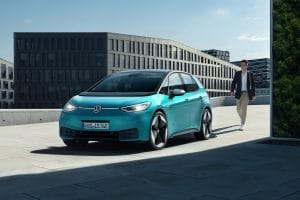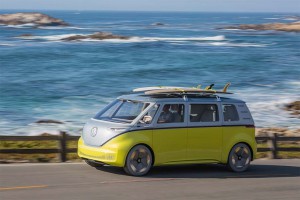
The ID.3 is the first production model off VW’s new MEB all-electric architecture, but it won’t come to the U.S.
The Volkswagen brand expects to be selling at least 1 million battery-electric vehicles, or BEVs, annually by 2023, the automaker says, moving that target up by a full two years.
The announcement by the German automaker also anticipated reaching sales of 1.5 million battery-cars annually by the end of 2025. If VW can meet that target it would position it to become one of the industry’s EV leaders, perhaps challenging Tesla for the global battery-car sales crown.
(Tesla begins delivering first EVs from new China plant.)
“2020 will be a key year for the transformation of Volkswagen,” said Thomas Ulrich, the board member overseeing VW’s EV offensive. “With the market launch of the ID.3 and other attractive models in the ID family, our electric offensive will also become visible on the roads.”
The numbers VW now quotes exclude products sold under its various other brands, including Audi and Porsche. The former began selling its all-electric e-tron SUV early this year, with at least two other models on the way. For its part, Porsche is preparing the sales launch of its first BEV, the Taycan, with several additional models, such as an all-electric version of the Macan SUV, in the works.

The automaker has teased the ID.4 hatchback which will be the first of its long-range BEVs for the U.S.
All told, the Volkswagen Group has been aiming to bring as many as 50 all-electric models to market by mid-decade, the VW brand producing the majority of them – and generating the lion’s share of sales.
Up until now, VW has been producing a handful of electrified models, such as the e-Golf. They’ve generated only marginal demand, sales of 50,000 in 2018. This year, volume is expected to reach a still-modest 70,000.
But that growth rate is forecast to accelerate rapidly with the launch of the new ID.3 hatchback, VW’s first long-range model. It’s currently set to begin deliveries in the spring of 2020 but, as TheDetroitBureau.com has reported, serious software issues have cropped up and likely won’t be fully addressed for several months. The carmaker has not said if that problem might delay initial sales.
(For more on VW’s “massive” software problem with the ID.3, Click Here.)
Following the roll-out of the ID.3, VW is expected to quickly introduce a series of other BEVs. That includes the ID.4 SUV that will be its first long-range model targeting the U.S. The electric SUV initially will be imported into the States but will become the first battery-car VW plans to produce domestically, once an $800 million expansion of its Chattanooga, Tennessee assembly plant is completed. The factory eventually will add a second BEV.
Among other models VW has confirmed, a modern-day, all-electric take on the classic Microbus, dubbed the ID.Buzz, will be assembled in Mexico.
To get demand up, VW is focusing not only on range but price. Some industry experts have suggested that the carmaker’s battery costs will tumble as volume rises, perhaps to as little as $100 per kilowatt-hour. That would compare to the $145 figure General Motors officials revealed when they launched the Chevrolet Bolt EV several years ago. Research by Boston Consulting Group has suggested that BEVs will struggle to reach parity with gas-powered vehicles until battery costs dip to around $70 per kWh, but a $100 figure would mark a significant step closer to that barrier.
While VW hasn’t confirmed what it will pay for its batteries it will launch the ID.3 at just over $33,000 for a 205-mile range version. More expensive battery pack options will boost that as high as 340 miles per charge.
VW’s accelerated sales forecast appears to be based on several key factors: primarily the tightening of CO2 emissions regulations in both China and the European Union. Chinese regulators recently posted draft guidelines increasing their mid-decade target for “New Energy Vehicles,” including EVs and BEVs, from 20% to 25% of overall new vehicle sales. Meanwhile, EU rules call for cutting CO2 emissions to just 95 grams per kilometer by 2021. Missing that target could result in billions of dollars in fines, but analysts say it would be difficult without the accelerated launch of new EVs.
(China’s annual NEV sales trending for decline in 2019)

